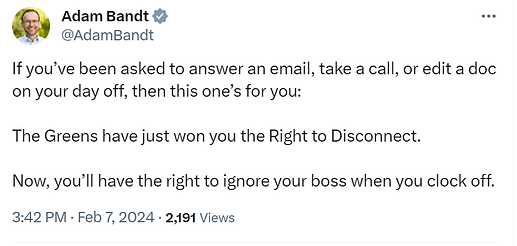@Alan_Noonan_10 has a good point. Should negative gearing be allowed on a holiday home, which is essentially a lifestyle expense rather than a pure investment. Using AirBnB etc. to rent out and offset the expense is just to subsidise the lifestyle. Setting 100% long term rental availability as the benchmark has merit.
I mean, this one shouldn’t have to be encoded into IR law.
I get there are some occupations (mine included) where this isn’t feasible, but it is written into my contract, and there is compensation within the remuneration.
But otherwise, this should just be standard practice.
big 4 consulting firm line managers about to become extinct
clarksonohnoanyway.mp4
well every other industry in this country died, so had to prop up construction somehow
and now shelter is a commodity, complete with high rating tv shows and large retailers glorifying it
well done everyone
How dare you come in here with that logical, rational and acheiveable nonsense
I think being contacted outside work and legislation to ensure it doesn’t happen is so heavy handed and an absolute unnecessary piece of legislation
Don’t like being contacted after work? Turn your phone off an leave your laptop at work.
Easy fix. What a waste of parliament’s time to even discuss this.
No problem with going after the AirBnb folk who are making money off it but people should be allowed to have holiday homes for their own personal use even if it’s empty 11 months per year
It’s not prohibiting the contacting.
I think it’s just protecting workers from repercussions if they refuse to answer/respond/complete the task.
I don’t think there is anything wrong with contacting someone outside hours if needed. But I equally think that coercing workers into doing things in personal time is a horrible practice, and workers should be empowered to say no.
They already are.
Workplaces just need to be less ■■■■■■.
They are only allowed to claim the interest to the extent that the property is available for rent on Airbnb, say 1/12months if that was the case.
The few people I know with airbnbs / shacks try and make it at least 50% available…and in their circumstance, it likely wouldnt be available for tentants if airbnb didnt exist, and they may not have gone the path to buy it as well.
Also apparently there are a lot of people looking to downsize, but due to stamp duty costs, and selling costs and lack of suitable properties / tight market, a lot of people are choosing to stay in existing homes.
Hence the legislation
I’m sceptical that business actually even know or cares when the Fair Work Act gets updated or revised
I share this scepticism. But without seeing the legislation, if the effect is anything like what’s been in place in France and other European countries for some time (granted greater degree of sophistication and democratic gumption than Oz) then in time we might take it for granted that work stops when paid minutes stop, as it should. And bring on the 4 day farking week.
which i’m sure they’ll do on their own if we just wait it out
No one is stopping them having a holiday home for personal use, it is just they cannot offset the cost against income, just like you can’t with your primary residence.
Here is one reference. I’ve seen FIRB data referred to as a good source of truth, no idea how you’d access this information? Maybe Property Council Australia has a database?
My issue is that these sorts of protections already exist. The push to have further unnecessary legislation is being largely driven by the unions. Its very tokenistic in my view. If unions gave a ■■■■ they’d be keeping workplaces to account under the current frameworks, but they’re not. This is a easy tokenistic win for them, which in my view will be pretty if not absolutely inconsequential.
I guarantee all you’ll see happen as a result of this is more employment contracts which specifically stipulate workers are required to be “on call” for 5 hours each week, after work hours.
Or workplaces chucking tanties because workers aren’t ready to work exactly at 9.00am on the dot.
Back to proper ozpol and here’s the good doctor Fels on what we all knew, the swell old boy free market entrepreneurs of the grocery world are having a laugh
Age - "“In short, firms are free to charge as much as they like. They can price gouge lawfully as long as there is no unlawful collusion,” Fels said in the report. “This has given rise to a policy gap – there is no set of government policies about excessive prices.”
Fels said over recent years there has been a “dramatic increase” in prices paid by Australians, and some of the biggest increases have occurred in sectors where there is little competition.
“At the same time as consumers experience significant increases in costs – across food and grocery, energy, and financial services – corporate profits are up,” he said.
“Some of Australia’s largest businesses, often supplying inelastic goods, are maintaining or even increasing margins in response to the global inflationary episode.
“This is a situation that warrants further investigation.”
How has this not prompted further/any discussion?
Yes, and there is no negative gearing on those houses at all.
